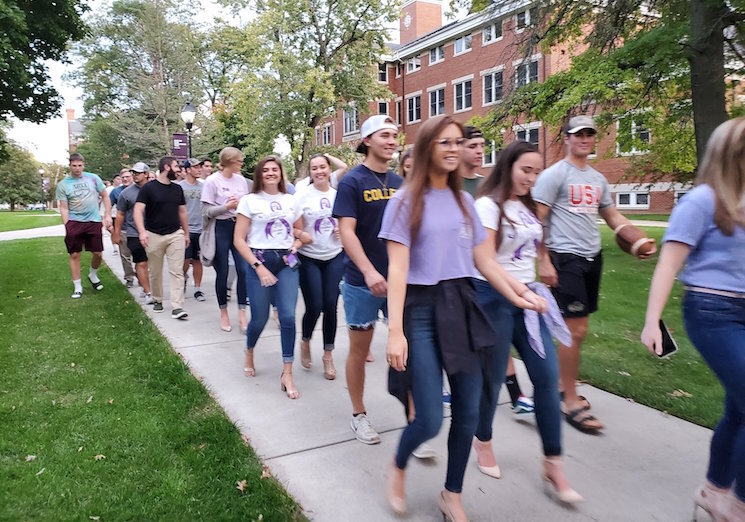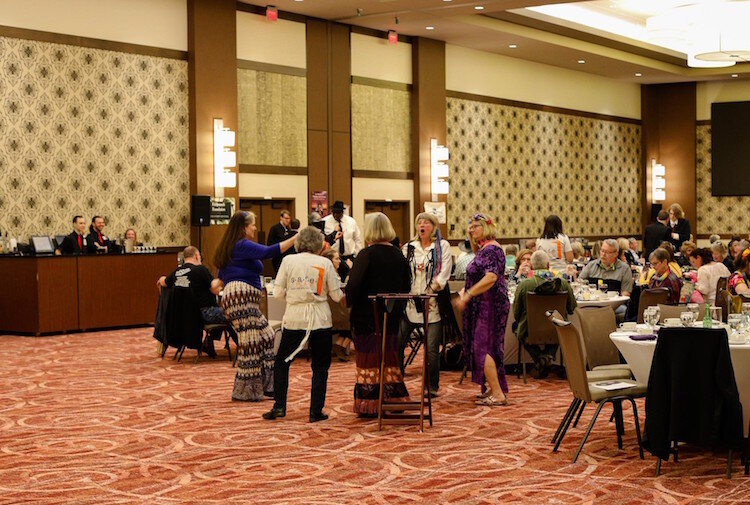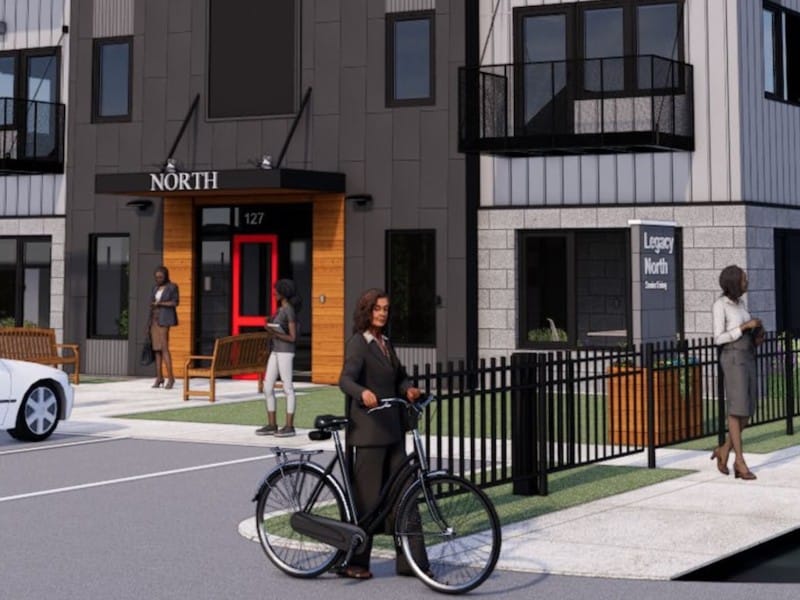Shelter for those escaping domestic violence reopens doors with social distancing in Calhoun County
During upheavals such as economic downturns and natural disasters domestic violence increases. S.A.F.E. Place, Calhoun County’s only domestic violence shelter, is finding ways to help even while it maintains social distancing requirements.
Editor’s note: This story is part of Southwest Michigan Second Wave’s On the Ground Battle Creek series and our ongoing COVID-19 coverage. if you have a story of how the community is responding to the pandemic please let us know here.
She couldn’t hear them and she couldn’t see them, but she knew they were out there — women and men throughout Calhoun County who were being abused by spouses or partners while the state of Michigan had strict shelter in place orders in effect.
“It was some combination of terror and helplessness,” is how Ellen Lassiter Collier, CEO of S.A.F.E. Place, Calhoun County’s only domestic violence shelter describes what she was feeling during the shutdowns that prevented her shelter from housing victims and their families.
“Our staff clearly knew that this form of violence doesn’t stop but was likely increasing during this time, and we knew people needed our help, but there were a lot of barriers to seeking services because there were additional social barriers in place.”

Social distancing requirements and closures that went into effect in mid-March kept S.A.F.E. Place from offering shelter to domestic violence victims and their children at its 54-bed facility.
Lassiter Collier says within the last seven weeks she and her staff have started to see people coming back into the shelter to seek services as restrictions have been lifted.
“They’re reaching out for legal services or counseling services,” she says. “The community, in general, is curious about what the courts were doing. As soon as the restrictions were lifting, the requests for Personal Protection Orders were happening. I would say it’s back to normal if not slightly” above normal.
The S.A.F.E. Place shelter has re-opened with limited capacity. Lassiter Collier says its usual 54-bed capacity has been reduced to 15. To address the gap, the organization has funds available to put clients up at area hotels.
Many of these are the same hotels that began taking clients from the shelter after S.A.F.E. Place officials determined in mid-March that they would have to move their staff to a work-from-home model and move their clients into other housing situations.
“Very early on we knew that congregate living was going to be really high risk because people were sharing bedrooms, restrooms, and kitchen spaces and that type of communal living we knew right away was extremely high risk because of the potential to spread the COVID-19 virus,” Lassiter Collier says. “We made that call pretty early on which was a little bit nerve-wracking because we wanted to provide an adequate level of safety for people staying with us because of safety reasons.”
S.A.F.E. Place staff worked with area hotels to get their clients moved in. The hotels were not identified and their employees were asked to sign confidentiality agreements to maintain the safety of the domestic violence shelter’s clients.
Lassiter Collier says her organization also worked with other community partners to make sure they were not sheltering their clients at the hotels chosen.
Throughout this time of alternative sheltering, the staff at S.A.F.E. Place continued to provide services to their clients through Telehealth, a virtual model. Of their 23 employees, three make up the counseling staff.
“We never ceased operations,” Lassiter Collier says.
This was critical as domestic violence calls to law enforcement were increasing throughout the state, says Sarah Prout Rennie, executive director of the Michigan Coalition to End Domestic and Sexual Violence, which represents about around 73 shelters and service providers statewide, including S.A.F.E. Place.
“The isolation due to the current pandemic is generating ‘a silent pandemic of increased violence,’” she says in a post on the University of Michigan’s Division of Public Safety and Security website. “Perpetrators aren’t going to stop being perpetrators and victims are often stuck in the house. It’s logical there’s going to be an increase.”
Calhoun County ranks among the top 10 counties for reported domestic violence cases with 1,301, according to the 2018 Michigan Incident Crime Reporting, a program operated through the Michigan State Police. Of these victims in 2018, 965 were women and 336 were men. Wayne County topped the list with 18,582, the report says, with the state total at 48,264.
In the first six weeks of the shutdown through the end of April, Lassiter Collier says her organization saw a decrease in the number of clients using their services. She says the ability to safely leave a violent situation was decreased for many victims because stay-at-home orders prevented them from having privacy to make that call for help.
“The victim has no way to make a phone call or leave safely,” Lassiter Collier says. “They want to come to the shelter, but then they’re asking themselves ‘What excuse can I use to get me and my kids out of the house because I can’t say I’m going to the park or grocery store.’ When you’re locked in the same home or apartment with the abuser, it’s incredibly challenging.”
She says her staff encourages people to text if they can’t call.
Research has shown that domestic violence increases during times of economic uncertainty, such as the recession brought on by the pandemic, or past natural disasters like Hurricane Katrina, according to the Department of Children and Families.
“While there is minimal conclusive evidence, due to data collection issues, there is a general consensus that domestic violence increases following a disaster and that the increase can be substantial. Generally speaking, the increase can be estimated at up to 50 percent,” Department of Children and Families officials say on their website. “This holds true for events in the U.S., as well as fires, flooding, tsunamis, earthquakes, and other disasters that have occurred around the world over the last 20-30 years.”
DCF reporting also indicates that “violence is inflicted by the perpetrator to gain a sense of control in a situation that seems out of control. The strain of the disaster creates family violence that develops when there is increased drug use, poor coping skills, sleep disturbances, increased depression, or re-surfacing of Post-Traumatic Stress Disorder” among other factors.
“We know from previous research and recessions that domestic violence increases during recessions,” Lassiter Collier says. “You’ve got people who are laid off. Economic tensions start which could lead to increased violence in the home.”
While women make up the majority of domestic violence victims, the violence against them occurs predominantly behind closed doors at home with the majority of cases having never been reported to police agencies, according to DCF.
Ninety percent of S.A.F.E. Place’s adult clients are women and there is a 50/50 split between single adults and those who come in with families that in at least one case numbered seven children. Lassiter Collier says her organization does not turn away anyone experiencing intimate partner violence who is seeking services based on identifiers including, race, gender, sexual orientation, disabilities, or religion.
With the need for services expected to increase as restrictions are further lifted, Lassiter Collier says she is seeking additional funding to replace dollars that won’t be generated through annual fundraising events like a Celebrity Server dinner at FireKeepers Casino. That event had been scheduled to take place for the 15th consecutive year this past Spring.
It had been postponed to this Fall before being officially cancelled because of health concerns about the pandemic. A golf outing on Sept. 25 is still on.
Signature fundraisers that generate significant revenues for many nonprofits have been impacted by COVID-19 imposed distancing restrictions. This prompted many nonprofits to seek dollars available through the Payroll Protection Program and the Coronavirus Aid, Relief and Economic Security (CARES) Act.
S.A.F.E. Place received CARES money which has been used to assist clients with expenses like rent and to cover the organization’s staffing and operational expenses. The organization also may be the beneficiary of some funding from a $14 million pool of state funds earmarked for food banks and domestic violence shelters.
“While the global health crisis has been difficult on us all, it has also provided additional challenges to those in domestic violence situations,” says Prout Rennie. “We’re proud of how domestic and sexual violence organizations have stepped up across the state, and we’re grateful that our elected officials are providing much-needed funding to help support shelters that have worked hard to keep their doors open and continue to provide essential services for victims and survivors.”
Lassiter Collier agrees. “We have been very lucky that our state and federal contracts have remained consistent and will remain consistent through the next fiscal year, and that only gets us so far. Just like any economic recession, people have less money to donate or support. A couple of our donors have been very generous at this time, but we’re looking at significant decreases in fundraising dollars.”
S.A.F.E. Place’s annual budget is about $1 million. About 67 percent of that comes through state and federal contracts. The remainder, Lassiter Collier says, is provided through private grants and contributions from individuals and organizations such as churches, the United Way, and foundations, including the Miller Foundation.
S.A.F.E. Place is essential given the fact that it is the only domestic violence shelter in Calhoun County, says Sara Wallace, president and CEO of the Miller Foundation, a longtime funder, and provider of volunteer leadership support to the shelter. In addition to providing a safe place for victims and their children, she cites the importance of their legal advocacy and counseling services.
“We really need them and we’re lucky to have them here,” says Wallace. “They’re filling a need for people who have been victims of domestic violence and giving them a period of safety where they are able to receive services and move on from the issues and trauma that they’ve been dealing with.
“We have to keep them around.”
















